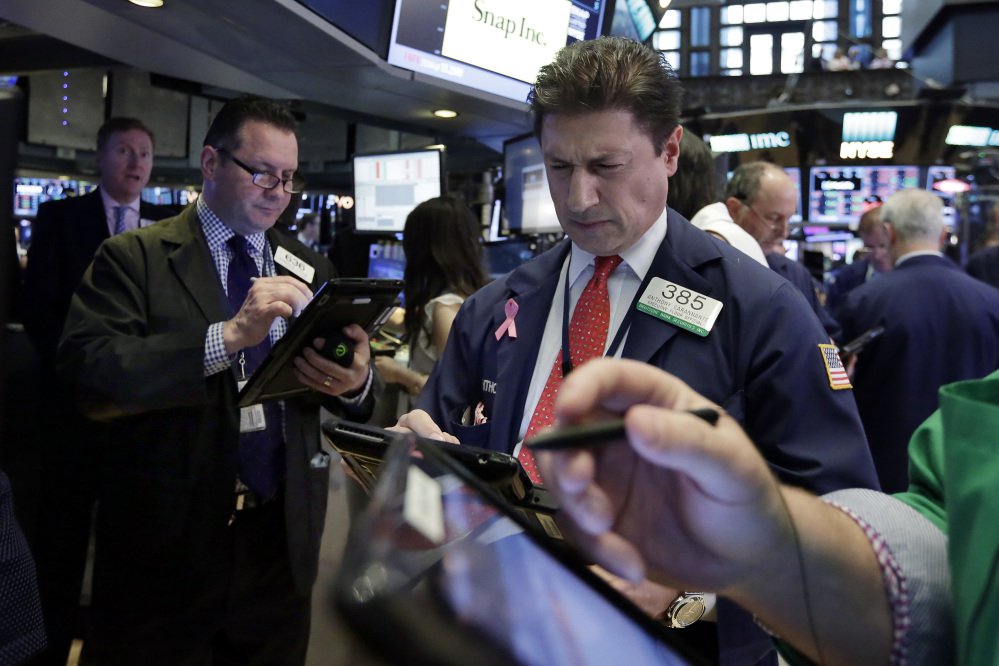The stock market on Wednesday took its biggest dive since before President Trump’s election, as investors began to grapple with the increasing possibility that Washington would be consumed with chaos and fail to enact policies to boost the economy.
The Dow Jones industrial average lost 368 points, or 1.8 percent to 20,611, as a broad array of other indexes all lost ground. Meanwhile, a widely followed measure of volatility known as the VIX, which had been remarkably subdued in recent months, spiked by a dramatic 21 percent, suggesting sharply growing anxiety by investors about a sense of rising political risk in Washington.
The developments are a stark interruption to the slow-and-steady rise in in stock market values since before Trump’s election. While the night of his surprise win in November created immediate uncertainty, with foreign markets selling off, they quickly regained their footing and resumed their years-long climb. Investors cited new hopes that a Washington unified by Republican control would deliver an overhaul of the tax system and a large increase in spending on U.S. infrastructure – two of corporate America’s top policy goals.
The White House embraced the notion of a “Trump Rally,” and cited the gains as evidence of its immediate effect on the economy.
But the disarray emanating from the White House now threatens to undermine those gains, as lawmakers, analysts and investors increasingly worry that it impede the Republican agenda.
“Right now, we have a Congress that is likely to be consumed with other priorities,” said Brad McMillan, chief investment officer at Commonwealth Financial Network.
Stocks dropped and foreign currencies gained against the U.S. dollar on Wednesday after reports that Trump reportedly asked then-FBI Director James Comey to drop his investigation into former National Security Adviser Michael Flynn’s relationship with Russia.
The Standard & Poor’s 500-stock index was off 1.8 percent, Nasdaq was down 2.6 percent and the Russell 2000 gave up 2.5 percent in trading Wednesday. The turbulance comes amid near-record highs following an eight-year bull run fueled by strong earnings, especially in the technology sector. The stock market has been on a tear since the November election.
“The latest controversy involving the Trump administration erodes confidence in his administration’s ability to enact tax reform,” said Michael Farr, who runs a Washington investment firm. “The prospect of significant tax reform has been buoying markets since President Trump was elected. We’ve had many controversies, but nothing has gotten the market’s attention. But once you start to go after tax reform, you are going to have the market’s full attention.”
Some have drawn comparisons between Trump’s troubles and those that brought down President Nixon.
Investor unease over then-President Nixon’s future as Watergate storm clouds gathered sent the stock market tumbling in early January 1973. The S&P 500 didn’t fully recover for nearly eight years.
Back then, however, the scandal was relatively advanced. Two top Nixon hands had already been indicted by a federal grand jury. The market topped out two days after the trial began for the seven men accused of breaking into Democratic party headquarters in the Watergate complex.
“There was tangible proof then that the White House was under serious pressure,” said Kim Wallace, head of Washington policy research at Renaissance Macro Research. “We haven’t seen that tangible proof, yet.”
McMillan said the current noise out of Washington alone is unlikely to derail the bull market.
“This is static,” he said. “From a historical perspective, it is just noise. To get a big pullback, typically you need a recession, the Federal Reserve raising rates or you need a spike in oil prices.”
Peterson said that despite the distractions out of Washington and the possibility that there is a loss of confidence in Trump, long-term market themes are positive.
“Earnings season has been very strong, both domestically and overseas,” he said. “This changes the calculus of how dependent the market has been on policy, when earnings have been so much better than what were pretty aggressive estimates.”
Tory Newmyer contributed to this report.
Send questions/comments to the editors.



Success. Please wait for the page to reload. If the page does not reload within 5 seconds, please refresh the page.
Enter your email and password to access comments.
Hi, to comment on stories you must . This profile is in addition to your subscription and website login.
Already have a commenting profile? .
Invalid username/password.
Please check your email to confirm and complete your registration.
Only subscribers are eligible to post comments. Please subscribe or login first for digital access. Here’s why.
Use the form below to reset your password. When you've submitted your account email, we will send an email with a reset code.